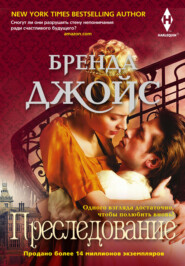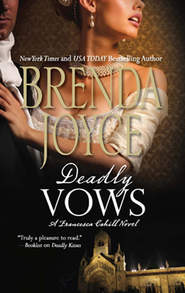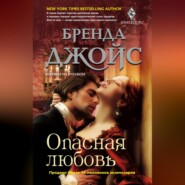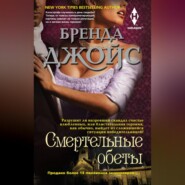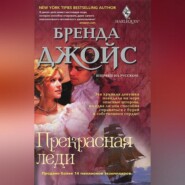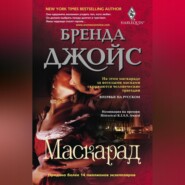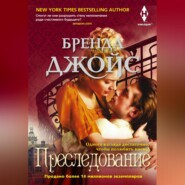По всем вопросам обращайтесь на: info@litportal.ru
(©) 2003-2025.
✖
Seduction
Автор
Год написания книги
2018
Настройки чтения
Размер шрифта
Высота строк
Поля
She nodded. “You mistook me for her, Charles.”
It was always best to stay as close to the truth as possible. “Nadine was my fiancée,” he said. “She got caught up in a riot in Paris and she did not survive it.”
Julianne cried out. “I am so sorry!”
“Paris isn’t even safe for the sans-culottes,” he said, referring to the unemployed and the homeless. “Unfortunately, the mobs are incited to violence more often than not.” He spoke calmly. “Nadine was knocked down when she tried to navigate the crowd.” That was true. He had known Nadine since childhood and their engagement had not surprised anyone. Nadine’s ancestral home was outside Nantes, just down the road from his mother’s chateau. Her family had fled France shortly after her death.
He had imagined her death in the riot many times; he was careful not to do so now. He was careful not to really think about what he was saying. He was careful not to feel. “You do not want to know the rest.”
It was a long moment before Julianne spoke. When she did, her gray eyes glistened with unshed tears. “I thought that the mobs were protesting the lack of employment and the high prices. Everyone deserves employment, a good wage and a decent price of bread. The poor cannot feed their families or even shelter them!”
Spoken like a true radical, he thought grimly. “Their distress is inflamed by the politicians,” he said, meaning it. “Yes, everyone should have employment and a wage, but the radicals—the Jacobins—deliberately incite crowds to violence. Fear rules the streets—the people. There is power for those who can cause the fear. And the innocent like Nadine are caught up in the violence and are its victims.” He knew he must stop, but he hadn’t actually said anything amiss. After all, any man would speak as he just had if his beloved fiancée had been murdered in a mob.
Julianne hesitated. “What happened to your fiancée is terrible, Charles. But really, if you were starving and without means, or if your employer paid you pennies for your labor while living in the lap of luxury, wouldn’t you take to the streets to protest? I would not need direction. And why would the Jacobins or anyone incite such extreme violence? I know they cherish human life—they hardly wish to cause innocent bystanders to die.”
She was so wrong, he thought grimly. She did not understand how power corrupted even the greatest cause. “I’m afraid I am not fond of politicians, not even radical ones.” He managed to soften, thinking it time to withdraw from the conversation.
But she was taken aback. “You almost sound like my brother Lucas. He favors reform, not revolution. He despises the mobs. He has accused the radicals in Paris of the same kinds of actions as you have. And Lucas fears violence here, at home.”
“Reform can be kinder and violence should always be feared.”
Her eyes widened. “The French nobility—the French king—would have never given the country a constitution without great pressure, Charles. The kind that comes from the rising up of hundreds of oppressed people.”
He smiled at her, knowing that she truly believed her words. But the pressure she spoke of had caused the execution of King Louis. Because of “pressure,” there was no constitutional monarchy now. Thousands of French noblemen had fled—and they would never return. Their lands had been taken away, or even destroyed. Why couldn’t she see the terrible loss that this was? Why didn’t she realize how savage and murderous the mobs were—and how many innocent men, women and children had died because of them? Would she still insist that this was liberty? Equality?
“I am against oppression. Who isn’t? But the violence in France is not justifiable. There are different ways one can achieve the same end, Julianne,” he finally said.
She stared at him, shocked. “Were you conscripted?” she finally asked.
He knew he must backtrack now. “I volunteered,” he said flatly. “There is no conscription in France. I am not against the revolution, Julianne, obviously. But I would have preferred a different means—a different beginning. But the convening of the Third Assembly has led us to this point in time, and there is no going back. Innocent men have died in my arms. Innocent men—and boys—will continue to die. I suppose I am glad you do not understand the reality.”
“I do understand,” she whispered, covering his hand with hers. “And I am so sorry for those you have lost. I am so sorry you have suffered so much pain.”
She did not understand at all, he thought. “I will fight to the death for my cause—the cause of freedom.” For him, freedom meant being able to live in the Loire Valley without fear of reprisal—without fear of having his home taken from him. Just then, his family and friends were fighting for that very freedom in le Loire, yet they were running out of arms and food.
“You are frightening me.”
He looked at her. The urge to take her in his arms was stunning. “That is not my intention.”
She had saved his life and he owed her a great debt that did not include this deception. It did not include seduction. But he could not deny the urgent attraction he felt. “You are afraid for me.”
“Yes,” she whispered.
“Death is a part of war, Julianne. Even you know that.”
“How can you be so casual about it?” she cried.
He almost told her that he did not feel casually about the subject at all. But he would never tell her any such thing. “Everyone dies sooner or later, whether in war or from sickness or from old age.”
She stared, stricken. “I must ask you something, Charles, and it is difficult for me.”
Although wary, he looked calmly at her.
“How long has it been since you lost Nadine?”
He instantly understood. “It has been a year and a half, Julianne.” He saw the flicker of relief in her eyes, and that twinge of guilt came again. Was she truly in love with her revolutionary war hero? “There has been so much death, in these past few years. One learns how to accept it rather quickly.”
She stood up and walked over to him and lay her shaking hand on his shoulder. “Do you still love her?”
“No.”
“I’m sorry.” She turned partially away. “I shouldn’t have asked. That was selfish of me.”
He stood, pulling her into his arms, and her soft, voluptuous body inflamed him. It was becoming hard to think clearly. “You had every right to ask.”
She was trembling. He could feel the same insane urgency in her. He turned up her face. “I have become very fond of you, Julianne.”
“So have I,” she gasped. “I am so glad…Jack brought you here. I am so glad…that we are friends.”
He looked at her parted lips, very carefully. It was becoming hard to think coherently. “But we are more than friends, no?” he asked softly.
“We are more than friends,” she whispered hoarsely.
“Soon, I will return to France.” Finally, he was speaking the truth.
The tears brimmed. “And I will miss you.”
And as they stared at one another, he heard a door downstairs slam.
He could not believe her sister’s timing. It would not serve him or his deception to have Amelia walk in on them now. But there was no turning back now. Surely, one kiss would not hurt either one of them.
Dominic bent over her, touching his mouth to hers. And very carefully, he feathered her lips with his. As he did, he was blinded by a flood of hot desire.
She gasped, seizing his shoulders, opening for him.
The desire brought a shocking anguish. And as he claimed her mouth, hard, the memories of blood and death, of rage and hatred, of distress and despair engulfed him. A part of him was in France, in agony, another part of him was with her, in ecstasy. He could not pull away. He could not check himself now. Nor did he want to.
He deepened the kiss, demanding everything from her, and she mated fiercely with his tongue.
And he thought, she should know better than to trust a stranger.
AMELIA AND JULIANNE had gone into the town of St. Just together for some groceries. Dominic stood at the top of the stairs, unbeknownst to them, and watched the sisters exit the house.
Julianne had been concerned about leaving him alone for an hour or two but he had reassured her.
She had accepted his promise that he would rest. He had appeared stoic, but inwardly, he had been thrilled.
Spying was inherent in his nature now. Everything he had learned about Greystone, the family and the area and its denizens, he had learned from Julianne. He was eager to go through the house, prying into the family’s lives and affairs. He didn’t expect to find very much, but one never knew. Jack Greystone held the most promise. He might claim not to care about the war, and be a simple smuggler, but he could be actively involved.







